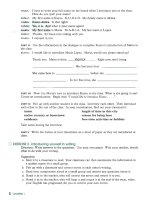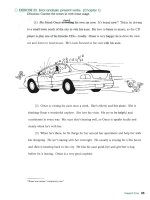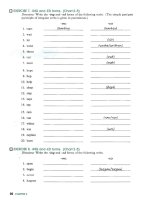Fundamentals of english grammar third edition part 75 pdf
Bạn đang xem bản rút gọn của tài liệu. Xem và tải ngay bản đầy đủ của tài liệu tại đây (364.2 KB, 7 trang )
in
polite questions,
197, 199
possibility, present/future,
195
Countlnoncount nouns,
313-342
noncount nouns,
313-3 15,322
D
Dependent clause, defined,
343fn.
(SEE
ALSO
Adjective clauses; Adverb
clauses; Noun clauses)
fiFerentfrom,
27
1
Direct speech
(SEE
Quoted speech)
Distance
(to
.
.
.&m,
how far),
140
Do
as main verb in what-questions,
130
Does, do, did:
in negative
(I don't.
.
.),
4,26
with
have to,
207
in questions
(Did you
. . .
?),
4,26, 12
1,
123
with
what,
130
in short answers
Wes, I do),
19,26, 121
Double comparatives
(the sooner, the bettm),
263
E
-Ed
(nsked,played),
25,32
past participle,
32, 84
as adjective
(a confucedperson),
297
pronunciation,
28
spelling,
29
Either,
235
Enough,
394
-Erlmore
and
-estlmost,
252-253,257
Etc.,
245fn.
Even though,
24
1
Ewr,
9
Every,
165
Expressions of quantity
(some, many),
3 18,
326
F
Far, much, a lot,
258
Farthorl~rther,
253fn.
(A)
fi?w,
3
1
8
For
(purpose)
(I went to the store fm milk),
39
1
For
and
since
(time)
(I stayed fm
two
doy),
86-87,95,98
For
(someone)
to do
(sumethind,
with
it
(It
is
important foryou to study),
388
Frequency:
adverbs
(always, somerimes),
9,102
expressions
(a lot,
every
day),
139
questions about, with
how om,
139
From, to,
to express distance,
140
Full stop (period),
226fn.
Future time,
55-82
be going to
and
will,
56,59,63
in if-clauses,
65
immediate
@e about to),
74
using present verbs to express
(It begins
tomorrow),
70-73
in time clauses
(Before he comes, we
will
.),
65
G
Gerunds
(riding, working),
368
following prepositions,
38
1
as subjects
(Riding horses
is
fun),
387
verbs followed by
(enjoy
working),
368,
374
Get
+
adjectivelpast participle
(get hungry,
get rired),
300
Get used tolamrstornod to,
303
Go
+
-ing
(go shopping),
372
Gonna
(going to),
56
7
H
Habitual past
(used
D
do something),
52
Had:
contracted with pronouns,
203
in past perfect
(She had already eaten),
112-1 13
Had better
Wou'd bew study),
190,203
Hanged
vs.
hung,
92fn.
Have,
auxiliary in present perfect
(Thq,
have eaten),
85
progressive
vs.
non-action,
17
in questions, main verb,
122)~.
5
Hove got
to,
190,206
Have to,
190,206
do
not have to,
207
Helping verbs
(SEE
Auxiliary verbs;
Negatives; Questions; individual
items)
Hors,
138,143
hourBbout,
149
hoeu
far,
140
howlong,
141
how
many (times),
139,322
how
much,
318,322
how ofren,
139
I
u-clauses,
65
expressing funwe time
in,
65
as
noun
clauses,
409,425
~ltubhr
in
noun clauses,
409,425
Immediate future
(be
about
to),
74
Imperative sentences
(St@!),
213
In,
as preposition
of
time,
163
Independent clause, defined,
343fi.
Indirect speech
(SEE
Reported speech)
In6nitives
(w
eat),
373-374
withit (Itisu(syo&eggs),
141,
387-388
with
modals~
w
st&),
190
purpose
(in
order
w),
391
with
tw
and
wan&
394
verbs followed by,
373-374
Information
quescio88,129
4np:
gerund
(Swimming
isfun),
368
present participle
(They
are swimming),
32
as
adjective
(an
interesting
book),
297
in
tenses
(SEE
Progressive verbs)
spellii
29,32
In
orde+
to,
3P1
Interested
vs.
inteesthag,
297
Intrsnsitive and transitive verbs.
280
Irregular noun plurals
(roma&,fih),
158,
173
Irregular verbs
(ear,
a,
earn),
list,
33
It,
to express distance
(It
is
au,
miles
. .
.),
140
It
+
infinitive
(It
is
eagy
w
do),
387-388
It
+
tak
(length
of time),
141
It.
vs.
it's,
176
L
The least,
265
Less
.
than,
259
Lot's,
215
Lied
vs.
Lay, lain,
3
lfn.
Like, alike,
27
1
Like. .
.
better,
218
(A)
littk,
3 18
Logical conclusion,
210
M
Main clause,
48,239,343fn.
Manylmuch,
3 18
May,
190,193
permission,
193, 197
polite question,
197
possibility,
60, 193
Maybe,
60,202
vs.
may be,
193
Measure, units of
(a
cup
of, a
pzece
on,
324
Midsentence adverbs
(dy, seldom),
9,102
Might,
190,193
Modal auxiliaries,
190-2 10
(SEE
ALSO
individual items)
in
passive,
288
Morel-er .
.
. than,
252-253,257
The most/-eat,
252-253,265
Much, a lot, far,
258
Must,
190
logical conclusion,
210
necessity,
206
Must not,
207,210
Nearly,
248
Negatives:
adverbs
(seldom, never),
9
be
+
not,
4
be
+
not
+
going
w,
56
past progressive
(waslwere not),
39
present perfect
(haslhave not),
85
present progressive
(amlislare not),
4
should
+
not (shouldn't),
202
simple past
(did not),
26
simple present
(doesldo
not),
4, 19
will
+
not (won't),
59
(SEE
ALSO
Contractions of verbs)
1
INDEX
Na'ther,
235
Non-action (nonprogressive) verbs
(know,
want, belong),
17
Noncount nouns
(furniture, mail),
313-315,322,324
units of measure with
(two cups of tea),
324
used as count nouns
(paper
vs.
a paper),
322
Not
(SEE
Negatives)
Notas
as,
259
Noun clauses,
403-4 15
with
ifwhether,
409,425
with question words
(what he said),
404
reported speech, sequence of tenses,
423
with
that (Ithink that
.),
414-415
Nouns:
coundnoncount
(chairslfurniture),
313-327
plural forms,
12, 158, 165
possessive
(Tom's),
173
as subjects and objects,
159
used as adjectives
(a flower garden),
168
0
Object pronouns, personal
(him,
them),
17
1
in adjective clauses
(whom I
met),
344,347
Objects:
of a preposition
(on the desk),
159
of a verb
(k
reading a book),
166
On,
as time preposition
(on Monday),
16'3
One of
+
plural noun,
265
Or,
228
Other,
181,183,186
Ought
to,
190,202
P
Parallel structure
with
and, but, or,
226,
228
with verbs
(walks and talks,
is
walking
and talkin&,
76
Participial adjectives
(interested
vs.
interesting),
297
Particles, in phrasal verbs
(put away),
432
Partitives (SEE Units of measure)
Passive
(It was mailed
by
Bob),
276
by-phrase, use of,
276,282
modal auxiliaries
(should be mailed),
288
stative
(is married),
292
summary of forms,
277,287
Past habit
(I used
im
live in
.
.
.),
52
Past participles, defined,
32,84
as adjectives
(be tired, be surprised),
292
following
get (get tired),
300
vs.
-ing (interested
vs.
interestink,,
297
of irregular verbs, list,
33
in passive,
276-277
Past perfect
(had
leji),
11
2-1 13
Past progressive
(was eating),
39
Past time,
24-52
(SEE
ALSO
Tenses)
Period,
226
Personal pronouns
(she, him, they),
17
1
Phrasal verbs, list,
449-452
intransitive,
443
nonseparable,
432
separable,
432
three-word,
446
Phrase, defined,
403h
Plural nouns,
12,158
(SEE
ALSO
Singular
and plural)
Polite questions using modals
(May
R
W€wldyou?),
197, 199,218
Possessive:
in adjective clauses
(whose),
359
nouns
(Tom's),
173
pronouns and adjectives
(mine
and
my),
176
hfer,
2 18
Prepositional phrases
(on the desk),
161
Prepositions
(ar,f/om, under):
combinations
with
verbs and adjectives,
453
followed by gerunds,
381
list,
161,463- 464
objects of,
161
as particle in phrasal verbs
(put off,put
on),
432
of place,
162fn, 164
vs. time, word order,
164
placement
in
adjective clauses,
355
placement in information questions,
l26fn
in stative passive
(be
married to),
292
of time
(in, on, aZ),
163
INDEX
5
Presen~&dpk
(eatink,,
32
as
djective
finf~e~Ebrk),
297
vs.
gerund, 368
Present perfect
(hawe
eaten),
84-1 13
defined,
87
Pteauu.
time, 4-19
(SEE
ALSO
Tenses)
Principal parts of a
verb
(cas,
a,
~aren,
eaaiq),
32
hbabb,
60
Progressive verb
T[M
+-in&,
32
in passive
(ic
being
&Me),
287
past(wus
doirPkt,
39,287
present
@
&i&&,
4,70,98,287
presenmpufect
&as
been
doink,,
98-100
vn,
non-adon
(I
am
thinking
vs.
I
think),
17
Pronouns:
in adjective clauses
(do,
wlbiclr),
344,
347-348
contractions
with
(REE
Contractions)
used as expressions of@mtitJr
(mwy,
sonrs),
3Z6
personal
(I,
them),
17 1
possessiw
(kb,drrin),
136
reflexive
(mysaZt;
th&&a),
178
Pronunciation:
-ed,
28
-s/-R(J
157
Pnoacllton:
apostrophe
(Tom's),
173
(SEE
ALSO
Conuactions)
comma:
in adverb dau8es, 48,239
vs.
a
p&&,
Z26
in quoted speech, 420
inasuieswkhmd,226
period, 226
quotation
marks,
420
Purpose
(k
oniLl
to,
fbr),
39
1
Q
Quantity, expressions of
@
lot,
sd),
318,32qlh.
Question %nus, 123
p~t progressive
(were
~mr
doing?),
39
pl%mperfe~t
(hV8
YOU
&?If$,
85
6-
present perfect progressive
Fawe they
been driving?),
98
present progressive
(are you doing?),
4
simple past
(did you do?),
26
simple present
(do you do?),
4
with
will (dyou do?),
59
Questions, 121-152
information
(why, when),
123
polite
(wouldyou please?),
197, 199,202
tag
(You
know
Bob, don't you?),
152
yeslno, 19, 121, 123
Question words, 123, 128
(SEE
ALSO
Noun
clauses; individual items)
Quite, 248
Quotation marks, 420
Quoted speech, 42M22
Reflexive pronouns
(myem,
178
Relative clauses
(SEE
Adjective clauses)
Reported speech, 422-423
-S/-es:
with plural nouns
@ids),
12, 158,313
pronunciation, 157
with simple present verbs
(eat),
4
spelling, 13
Same, similar, dflerent, like,
alike,
27 1
Say vs.
tell,
425
Sequence of tenses, in noun clauses, 423
Several, 3 18
Shall, 56
Short answers to questions, 19, 26,85,
121
Should, 190,202
Simple form of
a
verb, 32
Simple past, 25-26
vs. past progressive, 39
vs. present perfect, 87
Simple present, 4, 19
to express future time, 73
in future time clauses, 65
Since andfor, 86-87,95,98
Singular and plural:
nouns
(a bird, birdr),
158-159, 313
nouns used as adjectives flower gardens),
168
personal pronouns
(I,
we),
17
1
possessive nouns (student's, studenu'),
176
present tense verbs (eat),
4,12
verbs in adjective clauses (man who
ir,
men
who are),
354
So:
with
and (and so
do
0,235
conjunction (It was late, so
we
lefr),
230
substituted for that-clause
(I
think so),
418
Some,
313,326
Soltoola'therlneither,
235
Spelling:
-ed,
29
-erl-est,
253-254fn.
ing,
29
-s/-es,
13, 158
r
Stative (non-action) verbs,
17fn.
Stative passive (is married),
292
StiN.
102
Stop
(stop doing it vs. stop
to
do
it),
3701%.
Subject pronouns, personal
(I,
she, they),
171
in adjective clauses (a man who is,
a
book
which was),
344
Subjects, verbs, objects,
159
transitive vs. inuansitive verbs,
280
Subject-verb agreement,
165
in adjective clauses,
354
Superlatives,
252-253,265
Supposed to,
307
S-V-0-P-T, 164
Tag questions (You know Bob, don't you?),
152
Take,
with
it
to express length of time,
141
Tell
vs.
say, ask,
425
Tenses:
past perfect (had worked),
112-1 13
past progressive (were workink),
39
present perfect (have worked),
85-87,
95
present perfect progressive (have been
workink),
98-100
present progressive
(is
workink),
4
future meaning,
70
simple future
(will
work),
56
simple past (worked),
25-26, 32, 39,
87
simple present(works),
4
future meaning,
65,73
Than:
in comparatives (morel-er),
252,257,
260
following like better, would mther,
2 18
That:
in adjective clauses (a book that
I
read),
347-348,355
in noun clauses
(He
said that.
.
.),
414-415
The,
252,326-327
with
names,
338
Their,
they're, there,
17 6
Thsrs
+
be,
165
Think,
progressive
vs.
non-action,
17
Three-word verbs,
446
(SEE
ALSO
Phrasal
verbs)
,',
,.,
:
'
:
i
Time clauses, defined,
239jh.
form,
48
,'
.
~.
;.,
.
:
'
,
,~,
.
future,
65
,
-
. .
past,
48
.
.
,
I,
with
since,
95
To,,Srom,
to express distance,
140
'Zb
+
simple form (infinitive),
373-374
(in order)
to,
39
1
(excess amount),
394
with
and (and
I
do
too),
235
Transitive and intransitive verbs,
280
lko-word verbs,
432
(SEE
ALSO
Phrasal
verbs)
Units of measure (a
cup
of, a piece ofl,
324
Until,
48,65,67fn.
Used to
(past habit),
52
vs. be used to,
305
INDEX
7
v
Verbs:
principal parts of,
32
reporting,
423,425
vs.
subjects and objects,
159,280
transitidinuansitive,
280
(SEE
luso
Auxiliary verbs; Modal
auxiliaries; Passive; Phrasal
verbs;
kes; individual items)
WV,
258
Vowels,
13h.
W
Hbs,
were,
26,39
+
-ing
(maseating),
39
What,
125
in noun clauses,
403-415
what
about,
149
what
+
a form of
do,
130
what
kind
of,
132
what
rime
vs.
when,
124
whem
in
questions,
124
in time clauses,
39,48,65
Wkorr,
I24
Wkotksr,
409,425
which:
in adjective clauses,
348
in
noun clauses,
403-407
in questions,
133
While,
39,48,65
Will,
190
vs.
be
going
to,
63
forms,
59
future,
56
in
polite questions,
199
with
probably,
60
With
vs.
by,
384
Wholwho(m):
in
adjective clauses,
344, 347-348,
355
in
noun clauses,
407
in
questions,
123,125
who's
vs.
whose,
135,359fn.
Whose:
in
adjective clauses,
359
in
noun clauses,
407
in
questions,
135
Why,
124
Why
don't, 215
Word order
(s-V-0-P-T),
164
Wuld, 190
conuactions with pronouns,
218
in
polite questions,
199
in
reported speech,
423
Wuld
rather,
218
Y
Yeslno questions,
19, 121, 123,409
kt,
102
I
FUNDAMENTALS
OF
ENGLISH
GRAMMAR
with
ANSWER
KEY
Third
Edition
Betty Schrampferhr
&@
-
I
A
classic developmental skills text for laver-intermediate and intermediate students of English as
a second or foreign language,
hmdamentals of
English
Gmmmar
is a reference grammar
as
well
as
a
stimulating and teachable classroom text.
I
While keeping the same basic approach and material as in earlier editions, the third edition more fully
develops communicative and interactive language-learning activities. Some of the new features are:
Numerous "real communication" opportunities
More options for interactive work in pairs and groups
Additional open-ended communicative tasks for both speaking and writing
Expanded error-analysis exercises
Interesting and lively new exercise material
New appendices for phrasal verbs and prepositions
ADAMENTALS
OF
ENGLISH GRAMMAR,
Third
Edition,
includes:
I
Shdent Book
Full Edition: ISBN
0-13-013631-X
Volume
A:
ISBN
0-13-013646-8
.Volume B: ISBN
0-13-013652-2
Full edition with Answer Key:
ISBN
0-13-049447-X
Workbook,
consisting of self-study exercisgs for independent work
Full Edition: ISBN
0-13-013633-6
Volume
A:
ISBN
0-13-013647-6
Volume
B:
ISBN
0-13-013653-0
Chartbook,
a reference text consisting of only the grammar charts
ISBN
0-13-013635-2
Teacher's
Guide,
with teaching suggestions, grammar notes, and answers
ISBN
0-13-013634-4
I
m
AzarIGrammar Exchange Companion website
h!tp://www.longman.com/grammarexchange
Education
ILI









